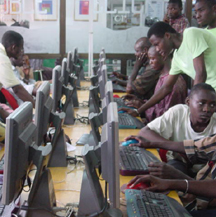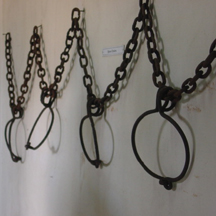Some time had passed between the time I first heard about DNA fingerprinting for tracing ancestral roots and when I completed a story on the issue for my employer, WJLA-TV (ABC) in Washington, D.C. In that report, Howard University’s human genome lab traced my male ancestry back to the Yoruba section of Nigeria. This is the second of two parts that recount my recent trip to the land of my ancestors. WJLA also aired a report on this trip.
Read Welcome to Nigeria Part I
of II.
The town of Ile Ife is said to be the home of all Yorubas. It is the home of their religion and of more than 200 shrines to various historical and religious icons. Yinka, our guide, took us to the shrine of Opa Oranmiyan. Tradition has it that Oranmiyan founded the army of the Oyo Empire, the powerful Yoruba kingdom that dominated much of what is now Nigeria during the 1700s and the early 1800s.
Opa means staff or stick in Yoruba. The caretaker, Chief Mo Akinyemi Owa Eredumi, arrived carrying his own opa. He told us that the shrine, consisting of a concrete 20-foot high staff, was the weapon of the great warrior Oranmiyan, who was big enough to use it, and that the warrior had stuck it in the ground where it now stands. He told us that the warrior was still alive despite the centuries that had past, but was invisible to all but himself, the chief, and a few others.
Since many consider Ife as the source of the Yoruba people wherever they live, I asked him whether that included me? He said he was taking me as a Yoruba man, who came from North America where my ancestors had been enslaved. “It was a hard path,” he said. “You need to come back. Not with cameras and such, but you need to come back home and settle in your father’s land,” he continued.
Later, we visited the home of Timothy and Doris Adewumi. They are born-again Christians. Timothy is a businessperson and says he spends 70 percent of his income on school fees. But, he says among Yorubas like himself, education is a valued treasure.
Timothy and Doris each have a car. They conserve electricity by air conditioning only the living room-dining room. Their kitchen and bathrooms have running water for bathing. The drinking and cooking water come from a well outside the house. Each of the children has his or her own room. The parents' room has its private bath. Their living room was full of family pictures. The TV was tuned to a gospel program with the preacher shouting and dancing across the stage.
There is no social safety net such as welfare or Social Security in Nigeria. The best safety net parents can have is lots of children whom they hope will take care of them when they are too old to provide for themselves. It is also common to take in children of less fortunate relatives.
I was surprised that Timothy, a Christian, has multiple wives. “That is our tradition,” was his response to my revelation. “Are you friends with the other wife?” I asked Doris. “No,” she responded, adding that her husband should treat his families equally.
Welcome to Nigeria


When asked what type of relationship she wants with her husband, their daughter said she would definitely be submissive. However, she added, “He will be the head. I will be the neck, not the tail.”
I was surprised that Timothy, a Christian, has multiple wives. “That is our tradition,” was his response. “Are you friends with the other wife?” I asked Doris.
Like many Nigerians, the Adewumis do not have a computer in their home. Therefore, cyber cafes are a necessity in Nigeria. We walked into the cafe owned by Idowu Salami and his wife. There were 50 computer bays, each full. The adjacent room was full of people, waiting their turn.
During our interview, as often happens in Nigeria, the power went out. For several seconds, the light level dropped, the computer screens went black, and then everything came back on again. “What happens when you have a black out?” I asked Salami. He said he has a generator that kicks in after 20 seconds.
After our adventure into the computer age, I went back to where freedom most likely ended for my African ancestor. With its stately palm trees and wind-blown surf, Badagry Beach is one of the most deceptively beautiful spots in Nigeria.
For yet one can only imagine the human suffering that haunts this beach, where slave traders herded hundreds of thousands of men and women onto ships, and sent them to work for free and against their will, in the mines, fields and factories of the Americas.
A tour of the Slave Museum in Badagry shows the shackles that the slave catchers forced the captured to wear around their necks while chained to the person in front and behind them. The slave catchers sold them to the French, British, and Portuguese. Each country had its own sector of Badagry where it kept goods for trading with local African slave catchers and held those enslaved until the ship arrived.
Slavery is so much a part of every family’s history in this city says the Badagry Museum Director Ashamu Fadipe, that parents hand-down the stories to their children. He recalled, “My parents told me, children were taken away from here. You must not forget your history. We want you to know that you have people of your own type in the United States, Brazil, and the rest of South America.”
Fadipe remembers. I remember; I carry the memories in my blood.
Read Welcome to Nigeria Part I of II.
I was surprised that Timothy, a Christian, has multiple wives. “That is our tradition,” was his response. “Are you friends with the other wife?” I asked Doris.
Like many Nigerians, the Adewumis do not have a computer in their home. Therefore, cyber cafes are a necessity in Nigeria. We walked into the cafe owned by Idowu Salami and his wife. There were 50 computer bays, each full. The adjacent room was full of people, waiting their turn.
During our interview, as often happens in Nigeria, the power went out. For several seconds, the light level dropped, the computer screens went black, and then everything came back on again. “What happens when you have a black out?” I asked Salami. He said he has a generator that kicks in after 20 seconds.
After our adventure into the computer age, I went back to where freedom most likely ended for my African ancestor. With its stately palm trees and wind-blown surf, Badagry Beach is one of the most deceptively beautiful spots in Nigeria.
For yet one can only imagine the human suffering that haunts this beach, where slave traders herded hundreds of thousands of men and women onto ships, and sent them to work for free and against their will, in the mines, fields and factories of the Americas.
A tour of the Slave Museum in Badagry shows the shackles that the slave catchers forced the captured to wear around their necks while chained to the person in front and behind them. The slave catchers sold them to the French, British, and Portuguese. Each country had its own sector of Badagry where it kept goods for trading with local African slave catchers and held those enslaved until the ship arrived.
Slavery is so much a part of every family’s history in this city says the Badagry Museum Director Ashamu Fadipe, that parents hand-down the stories to their children. He recalled, “My parents told me, children were taken away from here. You must not forget your history. We want you to know that you have people of your own type in the United States, Brazil, and the rest of South America.”
Fadipe remembers. I remember; I carry the memories in my blood.
Read Welcome to Nigeria Part I of II.
Advertisers | Contact Us | Events | Links | Media Kit | Our Company | Payments Pier
Press Room | Print Cover Stories Archives | Electronic Issues and Talk Radio Archives | Writer's Guidelines




